Auditing Enron's Collapse: A Comprehensive Analysis
VerifiedAdded on 2023/06/04
|7
|1478
|127
Report
AI Summary
This report provides a comprehensive analysis of the Enron collapse, examining the underlying causes such as accounting problems, unethical management practices, and the use of loopholes like mark-to-market accounting and special purpose entities. It discusses the immediate implications for Enron, including loss of investor confidence, share price decline, and bankruptcy, as well as the impact on stakeholders like shareholders, suppliers, and creditors. Furthermore, the report explores the implications for the corporate world, auditing profession, and corporate governance, highlighting the role of the Sarbanes-Oxley Act and the increased emphasis on ethical operations. Finally, it hypothesizes the auditing activities that could have reduced the likelihood or severity of the collapse, such as evaluating mark-to-market transactions and special purpose entities, and the importance of adherence to regulations to ensure financial stability.
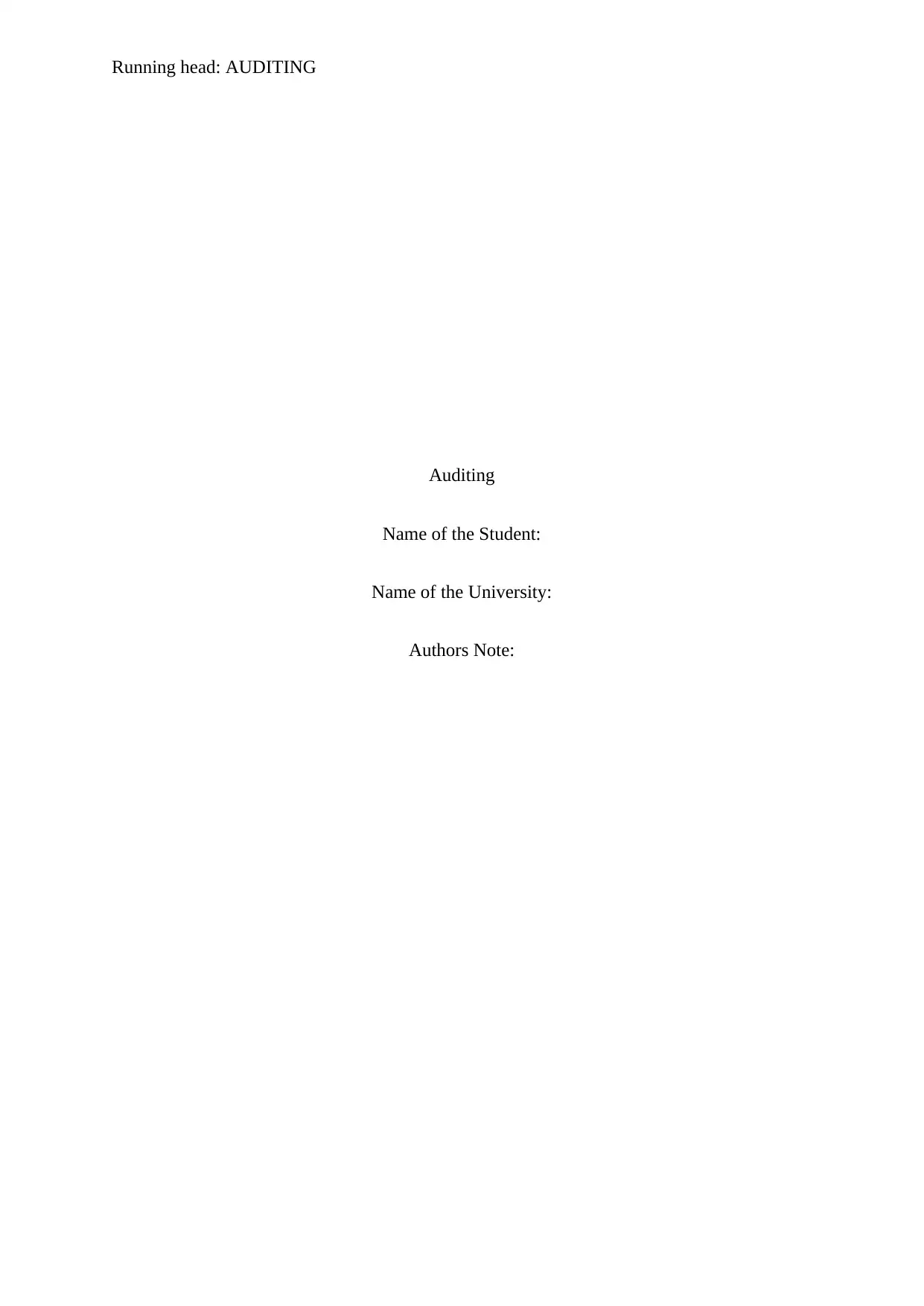
Running head: AUDITING
Auditing
Name of the Student:
Name of the University:
Authors Note:
Auditing
Name of the Student:
Name of the University:
Authors Note:
Paraphrase This Document
Need a fresh take? Get an instant paraphrase of this document with our AI Paraphraser
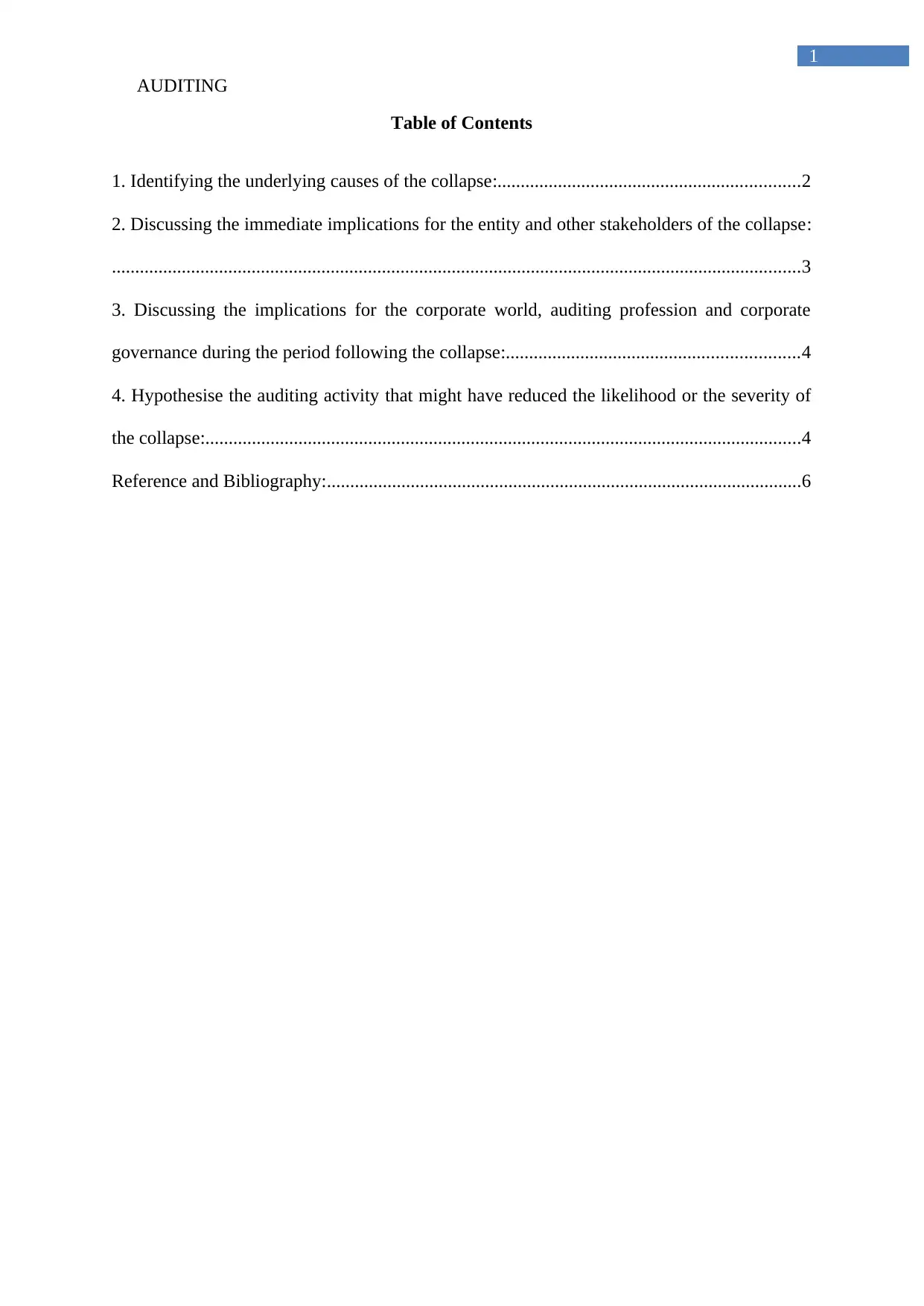
AUDITING
1
Table of Contents
1. Identifying the underlying causes of the collapse:.................................................................2
2. Discussing the immediate implications for the entity and other stakeholders of the collapse:
....................................................................................................................................................3
3. Discussing the implications for the corporate world, auditing profession and corporate
governance during the period following the collapse:...............................................................4
4. Hypothesise the auditing activity that might have reduced the likelihood or the severity of
the collapse:................................................................................................................................4
Reference and Bibliography:......................................................................................................6
1
Table of Contents
1. Identifying the underlying causes of the collapse:.................................................................2
2. Discussing the immediate implications for the entity and other stakeholders of the collapse:
....................................................................................................................................................3
3. Discussing the implications for the corporate world, auditing profession and corporate
governance during the period following the collapse:...............................................................4
4. Hypothesise the auditing activity that might have reduced the likelihood or the severity of
the collapse:................................................................................................................................4
Reference and Bibliography:......................................................................................................6
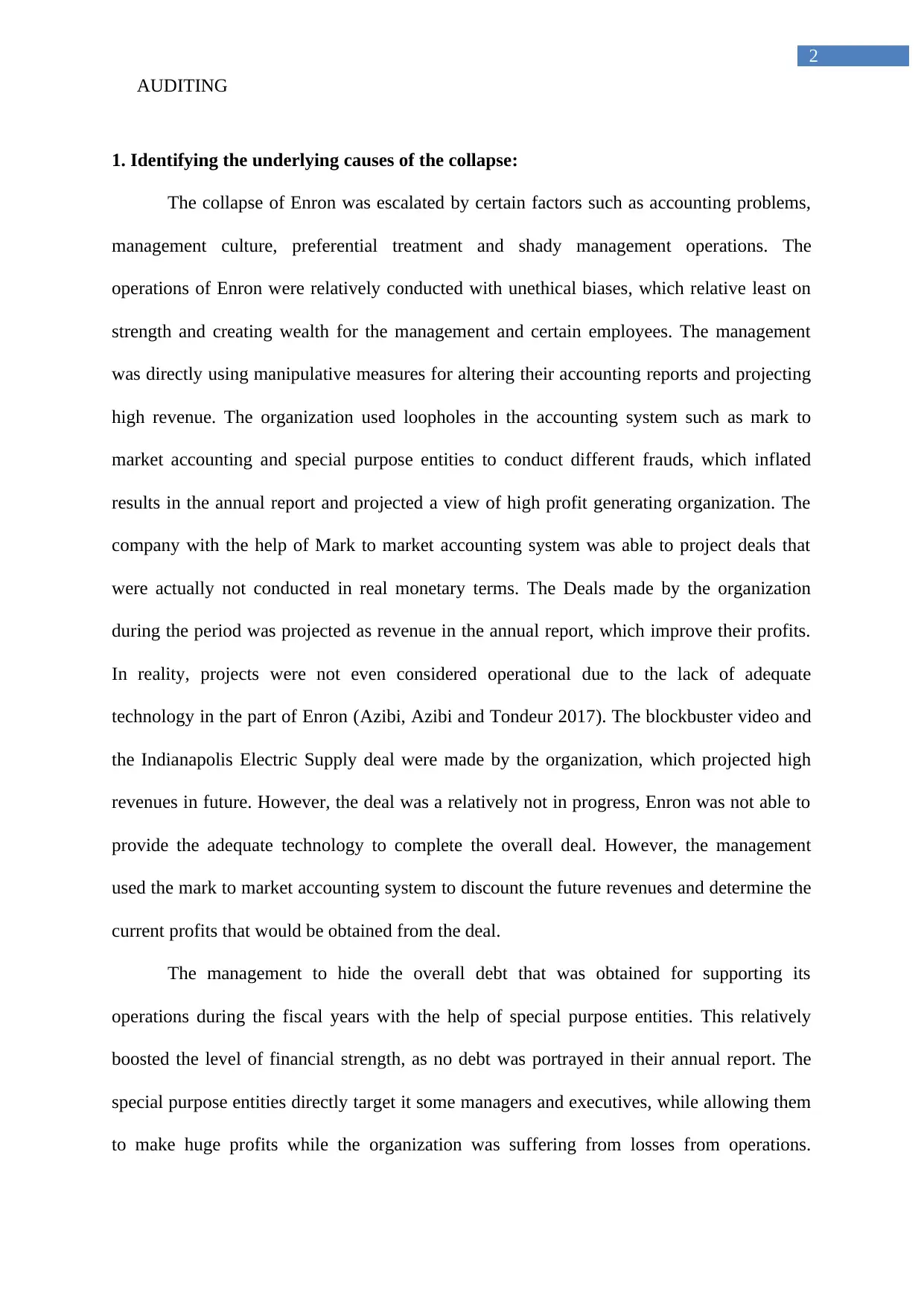
AUDITING
2
1. Identifying the underlying causes of the collapse:
The collapse of Enron was escalated by certain factors such as accounting problems,
management culture, preferential treatment and shady management operations. The
operations of Enron were relatively conducted with unethical biases, which relative least on
strength and creating wealth for the management and certain employees. The management
was directly using manipulative measures for altering their accounting reports and projecting
high revenue. The organization used loopholes in the accounting system such as mark to
market accounting and special purpose entities to conduct different frauds, which inflated
results in the annual report and projected a view of high profit generating organization. The
company with the help of Mark to market accounting system was able to project deals that
were actually not conducted in real monetary terms. The Deals made by the organization
during the period was projected as revenue in the annual report, which improve their profits.
In reality, projects were not even considered operational due to the lack of adequate
technology in the part of Enron (Azibi, Azibi and Tondeur 2017). The blockbuster video and
the Indianapolis Electric Supply deal were made by the organization, which projected high
revenues in future. However, the deal was a relatively not in progress, Enron was not able to
provide the adequate technology to complete the overall deal. However, the management
used the mark to market accounting system to discount the future revenues and determine the
current profits that would be obtained from the deal.
The management to hide the overall debt that was obtained for supporting its
operations during the fiscal years with the help of special purpose entities. This relatively
boosted the level of financial strength, as no debt was portrayed in their annual report. The
special purpose entities directly target it some managers and executives, while allowing them
to make huge profits while the organization was suffering from losses from operations.
2
1. Identifying the underlying causes of the collapse:
The collapse of Enron was escalated by certain factors such as accounting problems,
management culture, preferential treatment and shady management operations. The
operations of Enron were relatively conducted with unethical biases, which relative least on
strength and creating wealth for the management and certain employees. The management
was directly using manipulative measures for altering their accounting reports and projecting
high revenue. The organization used loopholes in the accounting system such as mark to
market accounting and special purpose entities to conduct different frauds, which inflated
results in the annual report and projected a view of high profit generating organization. The
company with the help of Mark to market accounting system was able to project deals that
were actually not conducted in real monetary terms. The Deals made by the organization
during the period was projected as revenue in the annual report, which improve their profits.
In reality, projects were not even considered operational due to the lack of adequate
technology in the part of Enron (Azibi, Azibi and Tondeur 2017). The blockbuster video and
the Indianapolis Electric Supply deal were made by the organization, which projected high
revenues in future. However, the deal was a relatively not in progress, Enron was not able to
provide the adequate technology to complete the overall deal. However, the management
used the mark to market accounting system to discount the future revenues and determine the
current profits that would be obtained from the deal.
The management to hide the overall debt that was obtained for supporting its
operations during the fiscal years with the help of special purpose entities. This relatively
boosted the level of financial strength, as no debt was portrayed in their annual report. The
special purpose entities directly target it some managers and executives, while allowing them
to make huge profits while the organization was suffering from losses from operations.
⊘ This is a preview!⊘
Do you want full access?
Subscribe today to unlock all pages.

Trusted by 1+ million students worldwide
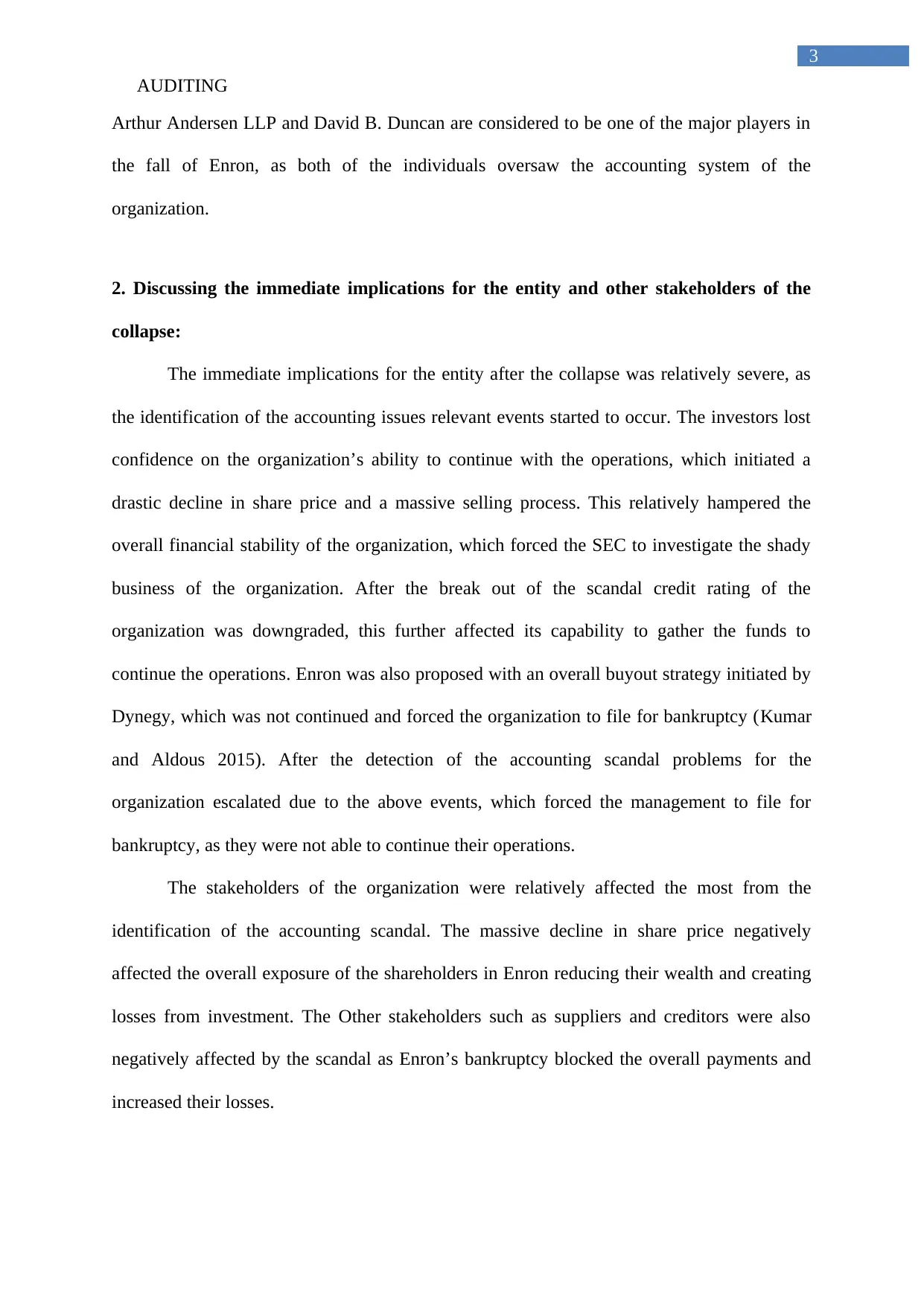
AUDITING
3
Arthur Andersen LLP and David B. Duncan are considered to be one of the major players in
the fall of Enron, as both of the individuals oversaw the accounting system of the
organization.
2. Discussing the immediate implications for the entity and other stakeholders of the
collapse:
The immediate implications for the entity after the collapse was relatively severe, as
the identification of the accounting issues relevant events started to occur. The investors lost
confidence on the organization’s ability to continue with the operations, which initiated a
drastic decline in share price and a massive selling process. This relatively hampered the
overall financial stability of the organization, which forced the SEC to investigate the shady
business of the organization. After the break out of the scandal credit rating of the
organization was downgraded, this further affected its capability to gather the funds to
continue the operations. Enron was also proposed with an overall buyout strategy initiated by
Dynegy, which was not continued and forced the organization to file for bankruptcy (Kumar
and Aldous 2015). After the detection of the accounting scandal problems for the
organization escalated due to the above events, which forced the management to file for
bankruptcy, as they were not able to continue their operations.
The stakeholders of the organization were relatively affected the most from the
identification of the accounting scandal. The massive decline in share price negatively
affected the overall exposure of the shareholders in Enron reducing their wealth and creating
losses from investment. The Other stakeholders such as suppliers and creditors were also
negatively affected by the scandal as Enron’s bankruptcy blocked the overall payments and
increased their losses.
3
Arthur Andersen LLP and David B. Duncan are considered to be one of the major players in
the fall of Enron, as both of the individuals oversaw the accounting system of the
organization.
2. Discussing the immediate implications for the entity and other stakeholders of the
collapse:
The immediate implications for the entity after the collapse was relatively severe, as
the identification of the accounting issues relevant events started to occur. The investors lost
confidence on the organization’s ability to continue with the operations, which initiated a
drastic decline in share price and a massive selling process. This relatively hampered the
overall financial stability of the organization, which forced the SEC to investigate the shady
business of the organization. After the break out of the scandal credit rating of the
organization was downgraded, this further affected its capability to gather the funds to
continue the operations. Enron was also proposed with an overall buyout strategy initiated by
Dynegy, which was not continued and forced the organization to file for bankruptcy (Kumar
and Aldous 2015). After the detection of the accounting scandal problems for the
organization escalated due to the above events, which forced the management to file for
bankruptcy, as they were not able to continue their operations.
The stakeholders of the organization were relatively affected the most from the
identification of the accounting scandal. The massive decline in share price negatively
affected the overall exposure of the shareholders in Enron reducing their wealth and creating
losses from investment. The Other stakeholders such as suppliers and creditors were also
negatively affected by the scandal as Enron’s bankruptcy blocked the overall payments and
increased their losses.
Paraphrase This Document
Need a fresh take? Get an instant paraphrase of this document with our AI Paraphraser
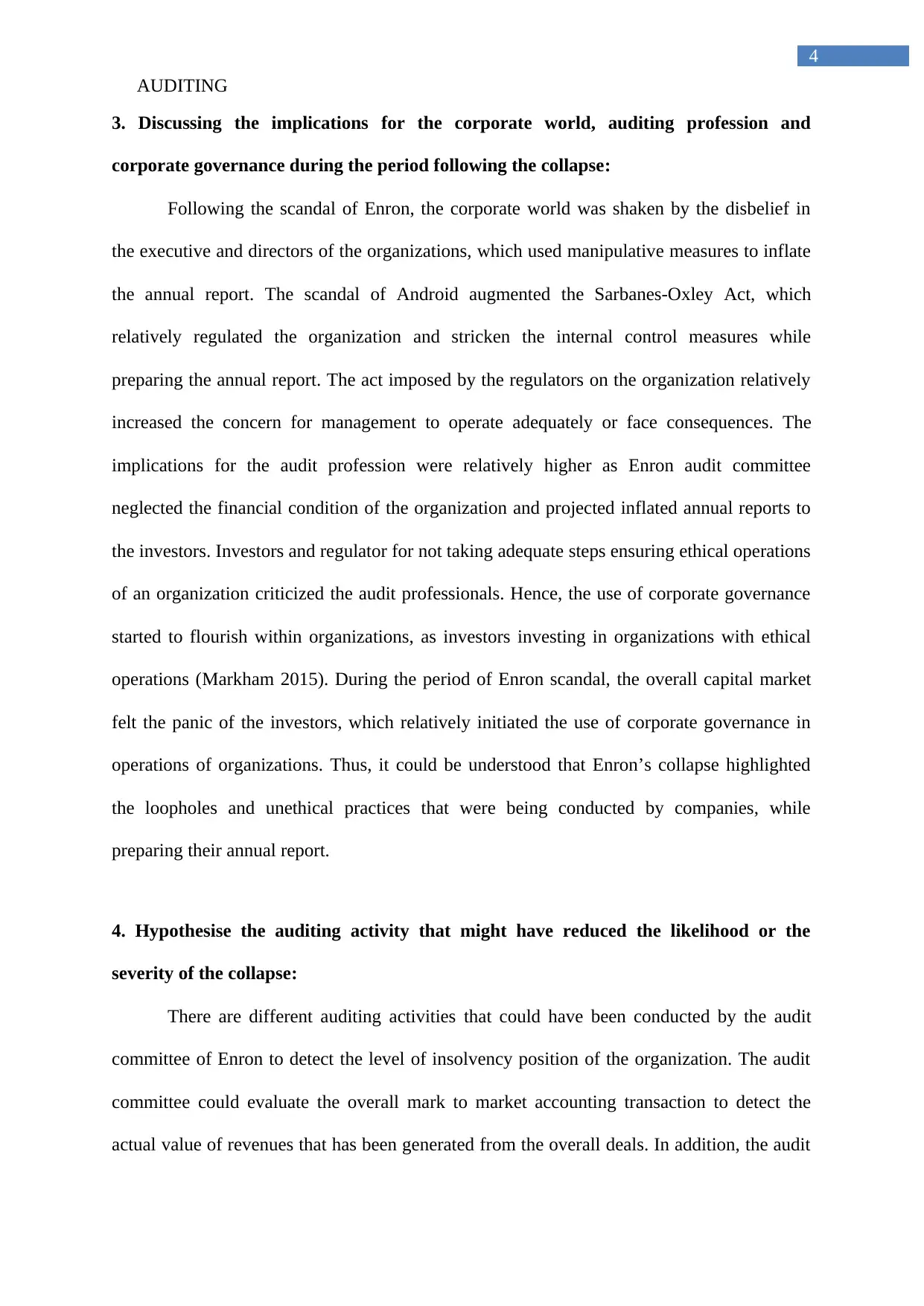
AUDITING
4
3. Discussing the implications for the corporate world, auditing profession and
corporate governance during the period following the collapse:
Following the scandal of Enron, the corporate world was shaken by the disbelief in
the executive and directors of the organizations, which used manipulative measures to inflate
the annual report. The scandal of Android augmented the Sarbanes-Oxley Act, which
relatively regulated the organization and stricken the internal control measures while
preparing the annual report. The act imposed by the regulators on the organization relatively
increased the concern for management to operate adequately or face consequences. The
implications for the audit profession were relatively higher as Enron audit committee
neglected the financial condition of the organization and projected inflated annual reports to
the investors. Investors and regulator for not taking adequate steps ensuring ethical operations
of an organization criticized the audit professionals. Hence, the use of corporate governance
started to flourish within organizations, as investors investing in organizations with ethical
operations (Markham 2015). During the period of Enron scandal, the overall capital market
felt the panic of the investors, which relatively initiated the use of corporate governance in
operations of organizations. Thus, it could be understood that Enron’s collapse highlighted
the loopholes and unethical practices that were being conducted by companies, while
preparing their annual report.
4. Hypothesise the auditing activity that might have reduced the likelihood or the
severity of the collapse:
There are different auditing activities that could have been conducted by the audit
committee of Enron to detect the level of insolvency position of the organization. The audit
committee could evaluate the overall mark to market accounting transaction to detect the
actual value of revenues that has been generated from the overall deals. In addition, the audit
4
3. Discussing the implications for the corporate world, auditing profession and
corporate governance during the period following the collapse:
Following the scandal of Enron, the corporate world was shaken by the disbelief in
the executive and directors of the organizations, which used manipulative measures to inflate
the annual report. The scandal of Android augmented the Sarbanes-Oxley Act, which
relatively regulated the organization and stricken the internal control measures while
preparing the annual report. The act imposed by the regulators on the organization relatively
increased the concern for management to operate adequately or face consequences. The
implications for the audit profession were relatively higher as Enron audit committee
neglected the financial condition of the organization and projected inflated annual reports to
the investors. Investors and regulator for not taking adequate steps ensuring ethical operations
of an organization criticized the audit professionals. Hence, the use of corporate governance
started to flourish within organizations, as investors investing in organizations with ethical
operations (Markham 2015). During the period of Enron scandal, the overall capital market
felt the panic of the investors, which relatively initiated the use of corporate governance in
operations of organizations. Thus, it could be understood that Enron’s collapse highlighted
the loopholes and unethical practices that were being conducted by companies, while
preparing their annual report.
4. Hypothesise the auditing activity that might have reduced the likelihood or the
severity of the collapse:
There are different auditing activities that could have been conducted by the audit
committee of Enron to detect the level of insolvency position of the organization. The audit
committee could evaluate the overall mark to market accounting transaction to detect the
actual value of revenues that has been generated from the overall deals. In addition, the audit
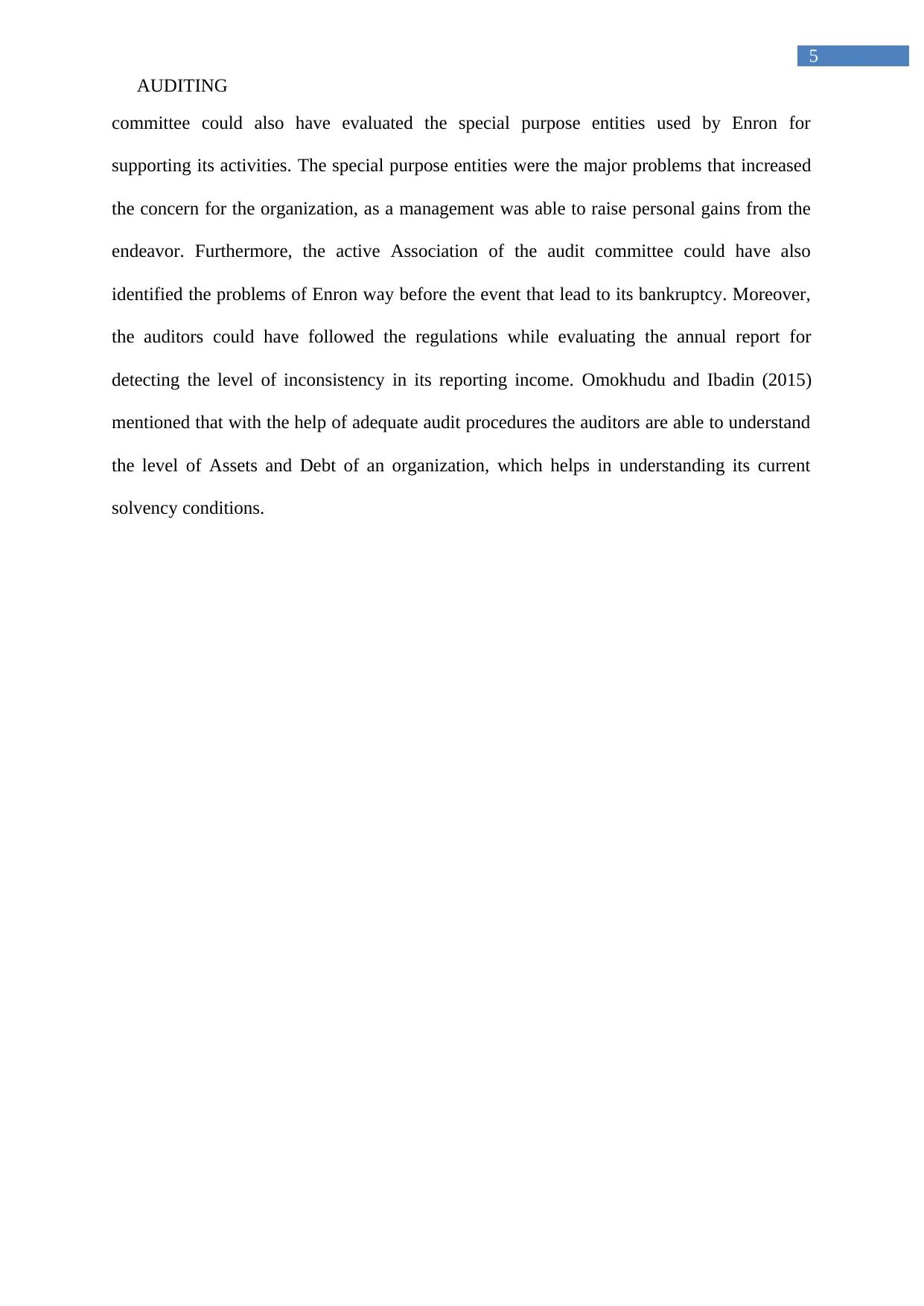
AUDITING
5
committee could also have evaluated the special purpose entities used by Enron for
supporting its activities. The special purpose entities were the major problems that increased
the concern for the organization, as a management was able to raise personal gains from the
endeavor. Furthermore, the active Association of the audit committee could have also
identified the problems of Enron way before the event that lead to its bankruptcy. Moreover,
the auditors could have followed the regulations while evaluating the annual report for
detecting the level of inconsistency in its reporting income. Omokhudu and Ibadin (2015)
mentioned that with the help of adequate audit procedures the auditors are able to understand
the level of Assets and Debt of an organization, which helps in understanding its current
solvency conditions.
5
committee could also have evaluated the special purpose entities used by Enron for
supporting its activities. The special purpose entities were the major problems that increased
the concern for the organization, as a management was able to raise personal gains from the
endeavor. Furthermore, the active Association of the audit committee could have also
identified the problems of Enron way before the event that lead to its bankruptcy. Moreover,
the auditors could have followed the regulations while evaluating the annual report for
detecting the level of inconsistency in its reporting income. Omokhudu and Ibadin (2015)
mentioned that with the help of adequate audit procedures the auditors are able to understand
the level of Assets and Debt of an organization, which helps in understanding its current
solvency conditions.
⊘ This is a preview!⊘
Do you want full access?
Subscribe today to unlock all pages.

Trusted by 1+ million students worldwide
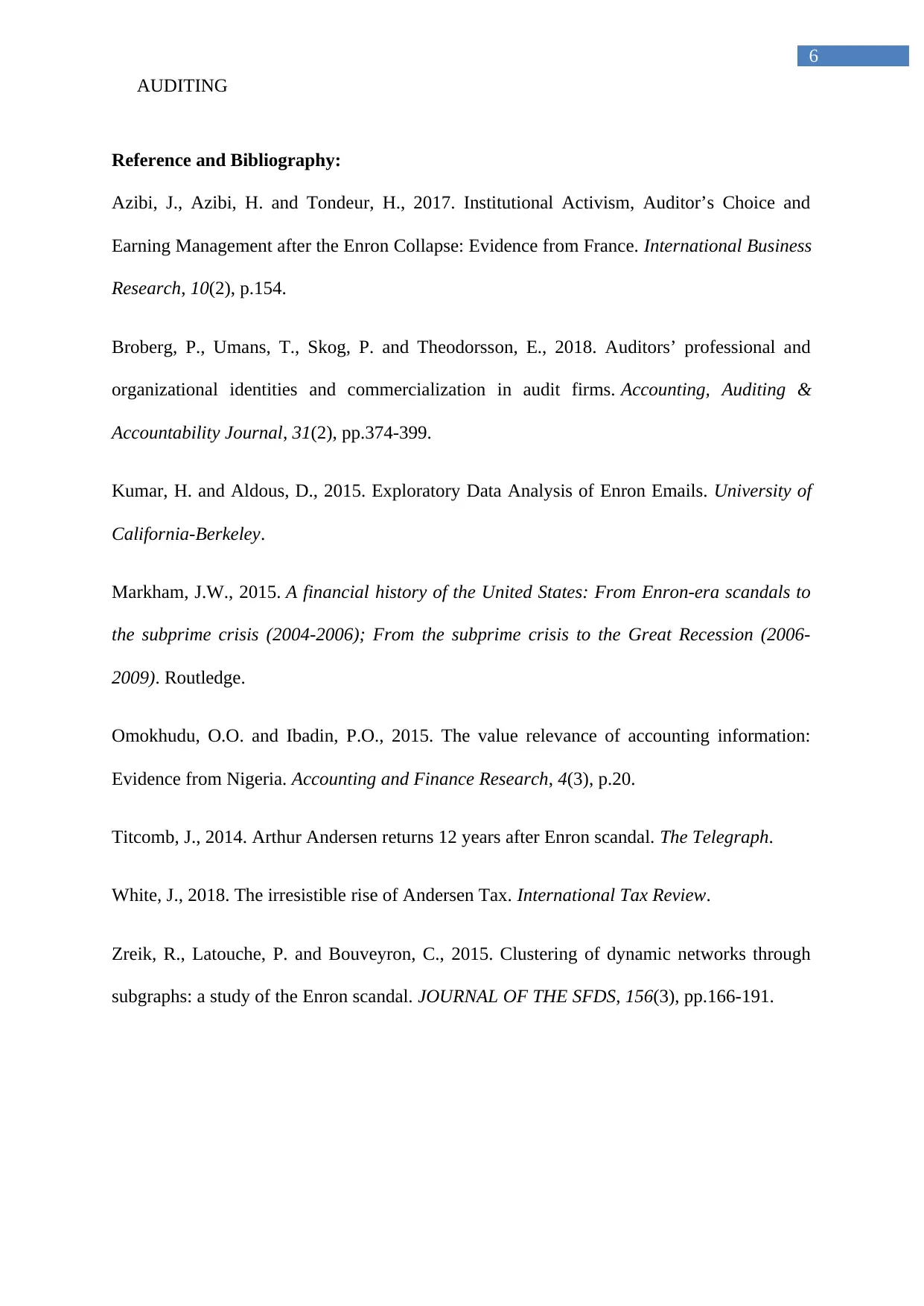
AUDITING
6
Reference and Bibliography:
Azibi, J., Azibi, H. and Tondeur, H., 2017. Institutional Activism, Auditor’s Choice and
Earning Management after the Enron Collapse: Evidence from France. International Business
Research, 10(2), p.154.
Broberg, P., Umans, T., Skog, P. and Theodorsson, E., 2018. Auditors’ professional and
organizational identities and commercialization in audit firms. Accounting, Auditing &
Accountability Journal, 31(2), pp.374-399.
Kumar, H. and Aldous, D., 2015. Exploratory Data Analysis of Enron Emails. University of
California-Berkeley.
Markham, J.W., 2015. A financial history of the United States: From Enron-era scandals to
the subprime crisis (2004-2006); From the subprime crisis to the Great Recession (2006-
2009). Routledge.
Omokhudu, O.O. and Ibadin, P.O., 2015. The value relevance of accounting information:
Evidence from Nigeria. Accounting and Finance Research, 4(3), p.20.
Titcomb, J., 2014. Arthur Andersen returns 12 years after Enron scandal. The Telegraph.
White, J., 2018. The irresistible rise of Andersen Tax. International Tax Review.
Zreik, R., Latouche, P. and Bouveyron, C., 2015. Clustering of dynamic networks through
subgraphs: a study of the Enron scandal. JOURNAL OF THE SFDS, 156(3), pp.166-191.
6
Reference and Bibliography:
Azibi, J., Azibi, H. and Tondeur, H., 2017. Institutional Activism, Auditor’s Choice and
Earning Management after the Enron Collapse: Evidence from France. International Business
Research, 10(2), p.154.
Broberg, P., Umans, T., Skog, P. and Theodorsson, E., 2018. Auditors’ professional and
organizational identities and commercialization in audit firms. Accounting, Auditing &
Accountability Journal, 31(2), pp.374-399.
Kumar, H. and Aldous, D., 2015. Exploratory Data Analysis of Enron Emails. University of
California-Berkeley.
Markham, J.W., 2015. A financial history of the United States: From Enron-era scandals to
the subprime crisis (2004-2006); From the subprime crisis to the Great Recession (2006-
2009). Routledge.
Omokhudu, O.O. and Ibadin, P.O., 2015. The value relevance of accounting information:
Evidence from Nigeria. Accounting and Finance Research, 4(3), p.20.
Titcomb, J., 2014. Arthur Andersen returns 12 years after Enron scandal. The Telegraph.
White, J., 2018. The irresistible rise of Andersen Tax. International Tax Review.
Zreik, R., Latouche, P. and Bouveyron, C., 2015. Clustering of dynamic networks through
subgraphs: a study of the Enron scandal. JOURNAL OF THE SFDS, 156(3), pp.166-191.
1 out of 7
Related Documents
Your All-in-One AI-Powered Toolkit for Academic Success.
+13062052269
info@desklib.com
Available 24*7 on WhatsApp / Email
![[object Object]](/_next/static/media/star-bottom.7253800d.svg)
Unlock your academic potential
Copyright © 2020–2026 A2Z Services. All Rights Reserved. Developed and managed by ZUCOL.




